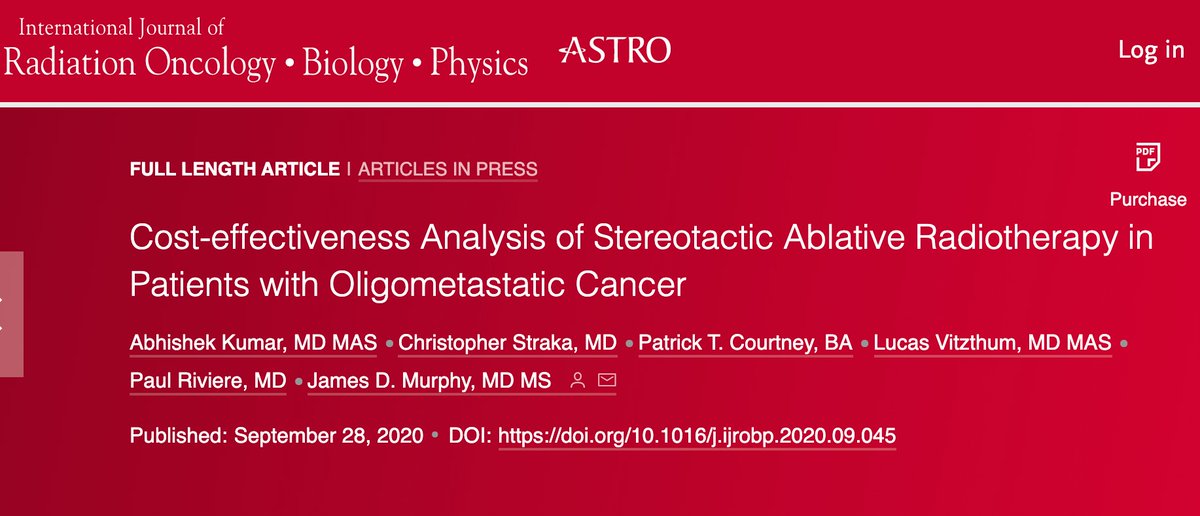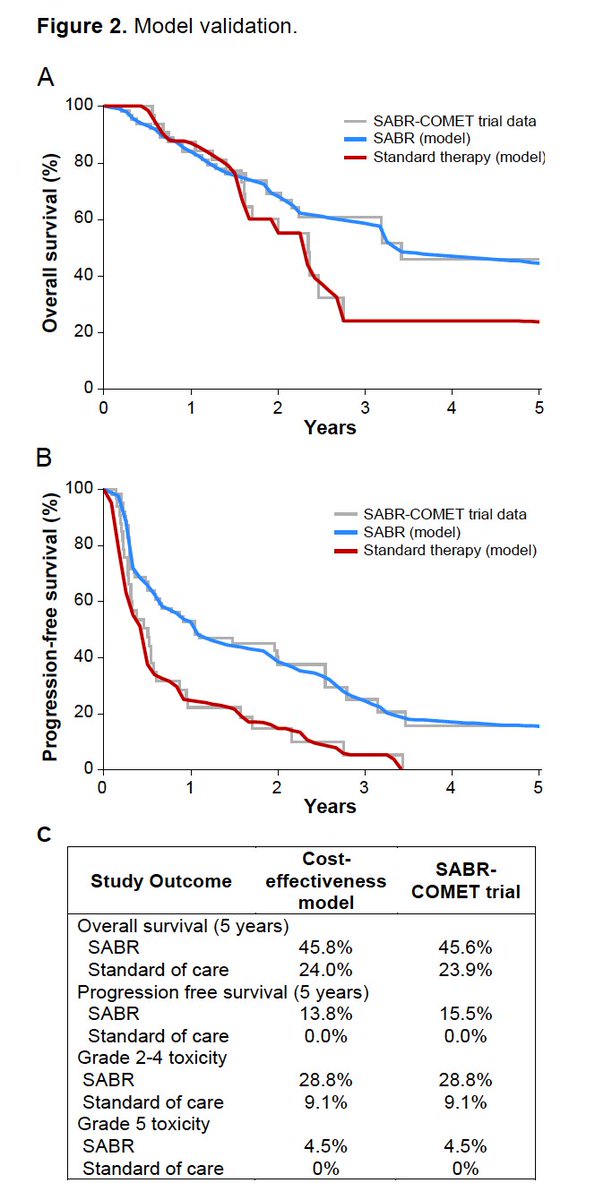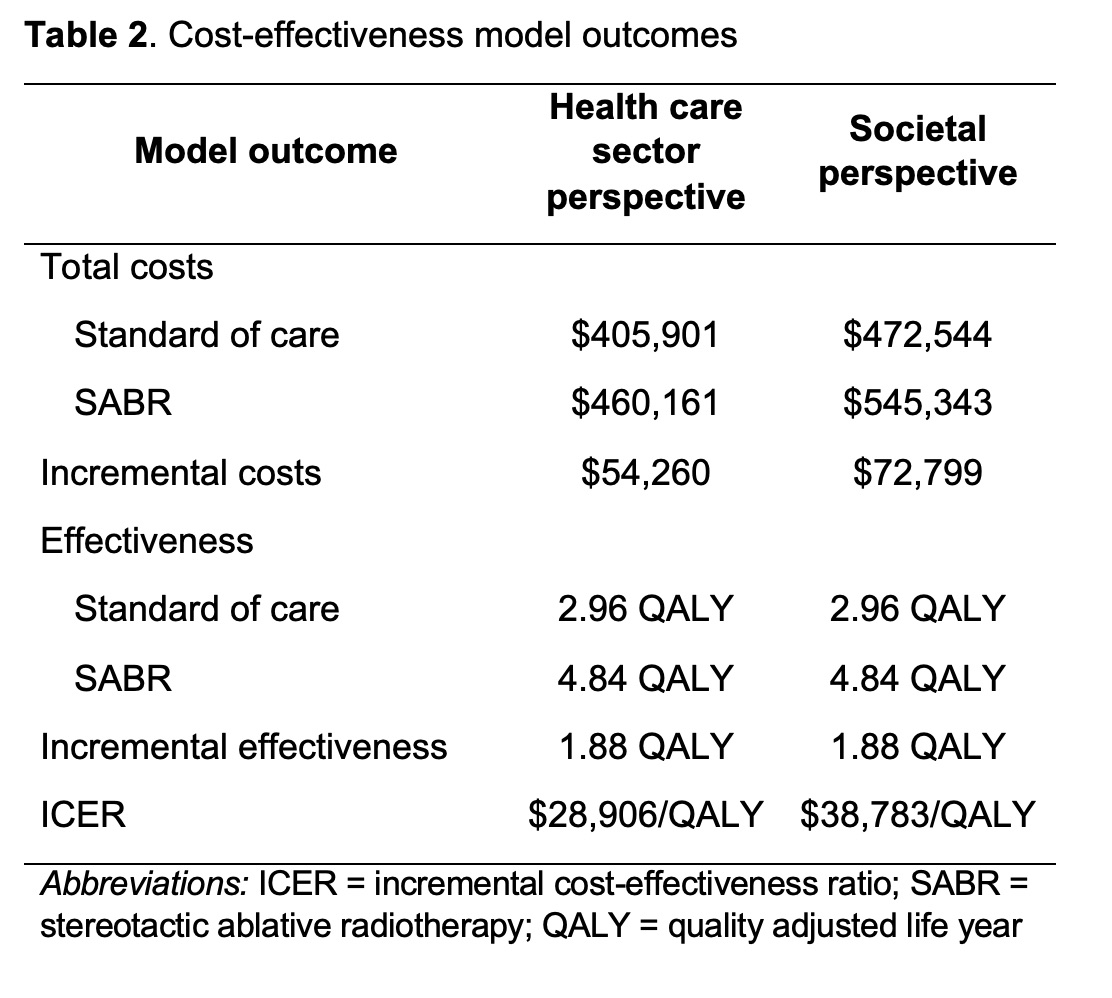TL;DR – Adding SABR was robustly cost-effective under a wide array of assumptions
Link: https://www.redjournal.org/article/S0360-3016(20)34347-9/fulltext
1/n">https://www.redjournal.org/article/S...
Before starting, want to give a HUGE thanks to my first #radonc mentor James Murphy (not on Twitter) from @UCSDRadMed who taught me this type of research & to co-authors.
I look forward to doing this type of work @DukeRadOnc 2/n
I look forward to doing this type of work @DukeRadOnc 2/n
@drdavidpalma & colleagues showed in Ph2 RCT SABR-COMET in @Lancet SABR directed at ≤5 oligometastatic lesions delays progression &  https://abs.twimg.com/emoji/v2/... draggable="false" alt="⬆️" title="Pfeil nach oben" aria-label="Emoji: Pfeil nach oben">survival.
https://abs.twimg.com/emoji/v2/... draggable="false" alt="⬆️" title="Pfeil nach oben" aria-label="Emoji: Pfeil nach oben">survival.
We estimated probabilities from SABR-COMET curves to model the trial & SEER data to estimate long-term survival beyond trial. 3/n
We estimated probabilities from SABR-COMET curves to model the trial & SEER data to estimate long-term survival beyond trial. 3/n
Costs assoc w/ tx & disease progression depend on cancer type. We identified costs from the lit for pts w/ metastatic colorectal, lung, prostate, & breast cancer, & used a weighted avg to reflect SABR-COMET.
Cost of SABR was estimated using Medicare reimbursement rates. 4/n
Cost of SABR was estimated using Medicare reimbursement rates. 4/n
Punchline:
Health care perspective: SABR https://abs.twimg.com/emoji/v2/... draggable="false" alt="⬆️" title="Pfeil nach oben" aria-label="Emoji: Pfeil nach oben"> costs by $54,260 from $405,901 to $460,161.
https://abs.twimg.com/emoji/v2/... draggable="false" alt="⬆️" title="Pfeil nach oben" aria-label="Emoji: Pfeil nach oben"> costs by $54,260 from $405,901 to $460,161.
SABR https://abs.twimg.com/emoji/v2/... draggable="false" alt="⬆️" title="Pfeil nach oben" aria-label="Emoji: Pfeil nach oben"> effectiveness by 1.88 QALYs, from 2.96 to 4.84 QALY
https://abs.twimg.com/emoji/v2/... draggable="false" alt="⬆️" title="Pfeil nach oben" aria-label="Emoji: Pfeil nach oben"> effectiveness by 1.88 QALYs, from 2.96 to 4.84 QALY
ICER = $28,906/QALY (health care) & $38,783/QALY (societal), cost-effective at a willingness-to-pay of $100,000/QALY. 5/n
Health care perspective: SABR
SABR
ICER = $28,906/QALY (health care) & $38,783/QALY (societal), cost-effective at a willingness-to-pay of $100,000/QALY. 5/n
1-way sensitivity analysis: model not sensitive to assumptions about SABR cost- it would need to  https://abs.twimg.com/emoji/v2/... draggable="false" alt="⬆️" title="Pfeil nach oben" aria-label="Emoji: Pfeil nach oben"> ≥10X (!!) from $12,500 to $145,688 (health care sector) or $127,150 (societal) before SABR became cost-ineffective. 6/n
https://abs.twimg.com/emoji/v2/... draggable="false" alt="⬆️" title="Pfeil nach oben" aria-label="Emoji: Pfeil nach oben"> ≥10X (!!) from $12,500 to $145,688 (health care sector) or $127,150 (societal) before SABR became cost-ineffective. 6/n
Our model demonstrated modest sensitivity to assumptions about tumor progression, but was not particularly sensitive to assumptions about overall survival (for this, pls refer to paper for nuances). 7/n https://www.redjournal.org/article/S0360-3016(20)34347-9/fulltext">https://www.redjournal.org/article/S...
SABR would be a cost-effective tx 99.8% (health care) or 98.7% (societal ) of the time at WTP of $100,000/QALY.  https://abs.twimg.com/emoji/v2/... draggable="false" alt="⬇️" title="Pfeil nach unten" aria-label="Emoji: Pfeil nach unten">WTP to $50,000/QALY: SABR cost-effective 87.8% (health care) or 71.1% (societal).
https://abs.twimg.com/emoji/v2/... draggable="false" alt="⬇️" title="Pfeil nach unten" aria-label="Emoji: Pfeil nach unten">WTP to $50,000/QALY: SABR cost-effective 87.8% (health care) or 71.1% (societal).  https://abs.twimg.com/emoji/v2/... draggable="false" alt="⬆️" title="Pfeil nach oben" aria-label="Emoji: Pfeil nach oben"> $200,000/QALY: SABR cost effective >99.9% (health care) or 99.9% (societal) 8/n
https://abs.twimg.com/emoji/v2/... draggable="false" alt="⬆️" title="Pfeil nach oben" aria-label="Emoji: Pfeil nach oben"> $200,000/QALY: SABR cost effective >99.9% (health care) or 99.9% (societal) 8/n
We are not the 1st to show SABR cost-effectiveness. @DrLesterColl & @davidSher showed in a recent review of 24 studies involving SABR that it was the cost-effective option in 80% of studies. https://link.springer.com/article/10.1007%2Fs11912-017-0599-0
In">https://link.springer.com/article/1... our analysis SABR cost represented <5% total costs (!) 9/n
In">https://link.springer.com/article/1... our analysis SABR cost represented <5% total costs (!) 9/n
@VPrasadMDMPH writes, “Before you conduct a cost-effectiveness analysis, you have to know that a therapy is effective”. Many Ph2 trials in oligometastatic dz in addition to SABR-COMET indicate benefit of SABR. Ph3 trials needed to clarify which pts will benefit most. 10/n
Yet, in this era of cost-savings/reduced/bundled payments, I believe this research is important *now* to show **value** of radiation treatment.
Thanks all for making it this far in my 1st tweetorial https://abs.twimg.com/emoji/v2/... draggable="false" alt="🧵" title="Thread" aria-label="Emoji: Thread">.
https://abs.twimg.com/emoji/v2/... draggable="false" alt="🧵" title="Thread" aria-label="Emoji: Thread">.
Final/n
Thanks all for making it this far in my 1st tweetorial
Final/n

 Read on Twitter
Read on Twitter My 1st *Tweetorial*! We investigated cost-effectiveness of adding SABR to standard tx for pts with oligometastatic dz. Manuscript out in #RedJournal!TL;DR – Adding SABR was robustly cost-effective under a wide array of assumptionsLink: https://www.redjournal.org/article/S..." title="https://abs.twimg.com/emoji/v2/... draggable="false" alt="🧵" title="Thread" aria-label="Emoji: Thread">My 1st *Tweetorial*! We investigated cost-effectiveness of adding SABR to standard tx for pts with oligometastatic dz. Manuscript out in #RedJournal!TL;DR – Adding SABR was robustly cost-effective under a wide array of assumptionsLink: https://www.redjournal.org/article/S..." class="img-responsive" style="max-width:100%;"/>
My 1st *Tweetorial*! We investigated cost-effectiveness of adding SABR to standard tx for pts with oligometastatic dz. Manuscript out in #RedJournal!TL;DR – Adding SABR was robustly cost-effective under a wide array of assumptionsLink: https://www.redjournal.org/article/S..." title="https://abs.twimg.com/emoji/v2/... draggable="false" alt="🧵" title="Thread" aria-label="Emoji: Thread">My 1st *Tweetorial*! We investigated cost-effectiveness of adding SABR to standard tx for pts with oligometastatic dz. Manuscript out in #RedJournal!TL;DR – Adding SABR was robustly cost-effective under a wide array of assumptionsLink: https://www.redjournal.org/article/S..." class="img-responsive" style="max-width:100%;"/>
 survival.We estimated probabilities from SABR-COMET curves to model the trial & SEER data to estimate long-term survival beyond trial. 3/n" title=" @drdavidpalma & colleagues showed in Ph2 RCT SABR-COMET in @Lancet SABR directed at ≤5 oligometastatic lesions delays progression & https://abs.twimg.com/emoji/v2/... draggable="false" alt="⬆️" title="Pfeil nach oben" aria-label="Emoji: Pfeil nach oben">survival.We estimated probabilities from SABR-COMET curves to model the trial & SEER data to estimate long-term survival beyond trial. 3/n" class="img-responsive" style="max-width:100%;"/>
survival.We estimated probabilities from SABR-COMET curves to model the trial & SEER data to estimate long-term survival beyond trial. 3/n" title=" @drdavidpalma & colleagues showed in Ph2 RCT SABR-COMET in @Lancet SABR directed at ≤5 oligometastatic lesions delays progression & https://abs.twimg.com/emoji/v2/... draggable="false" alt="⬆️" title="Pfeil nach oben" aria-label="Emoji: Pfeil nach oben">survival.We estimated probabilities from SABR-COMET curves to model the trial & SEER data to estimate long-term survival beyond trial. 3/n" class="img-responsive" style="max-width:100%;"/>
 costs by $54,260 from $405,901 to $460,161. SABR https://abs.twimg.com/emoji/v2/... draggable="false" alt="⬆️" title="Pfeil nach oben" aria-label="Emoji: Pfeil nach oben"> effectiveness by 1.88 QALYs, from 2.96 to 4.84 QALYICER = $28,906/QALY (health care) & $38,783/QALY (societal), cost-effective at a willingness-to-pay of $100,000/QALY. 5/n" title="Punchline:Health care perspective: SABR https://abs.twimg.com/emoji/v2/... draggable="false" alt="⬆️" title="Pfeil nach oben" aria-label="Emoji: Pfeil nach oben"> costs by $54,260 from $405,901 to $460,161. SABR https://abs.twimg.com/emoji/v2/... draggable="false" alt="⬆️" title="Pfeil nach oben" aria-label="Emoji: Pfeil nach oben"> effectiveness by 1.88 QALYs, from 2.96 to 4.84 QALYICER = $28,906/QALY (health care) & $38,783/QALY (societal), cost-effective at a willingness-to-pay of $100,000/QALY. 5/n" class="img-responsive" style="max-width:100%;"/>
costs by $54,260 from $405,901 to $460,161. SABR https://abs.twimg.com/emoji/v2/... draggable="false" alt="⬆️" title="Pfeil nach oben" aria-label="Emoji: Pfeil nach oben"> effectiveness by 1.88 QALYs, from 2.96 to 4.84 QALYICER = $28,906/QALY (health care) & $38,783/QALY (societal), cost-effective at a willingness-to-pay of $100,000/QALY. 5/n" title="Punchline:Health care perspective: SABR https://abs.twimg.com/emoji/v2/... draggable="false" alt="⬆️" title="Pfeil nach oben" aria-label="Emoji: Pfeil nach oben"> costs by $54,260 from $405,901 to $460,161. SABR https://abs.twimg.com/emoji/v2/... draggable="false" alt="⬆️" title="Pfeil nach oben" aria-label="Emoji: Pfeil nach oben"> effectiveness by 1.88 QALYs, from 2.96 to 4.84 QALYICER = $28,906/QALY (health care) & $38,783/QALY (societal), cost-effective at a willingness-to-pay of $100,000/QALY. 5/n" class="img-responsive" style="max-width:100%;"/>



